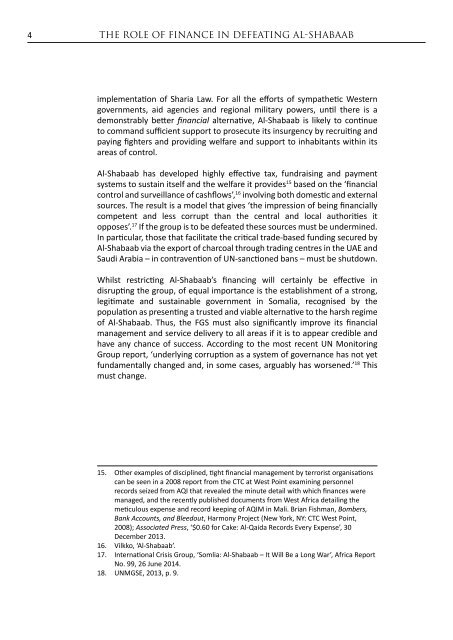Create successful ePaper yourself
Turn your PDF publications into a flip-book with our unique Google optimized e-Paper software.
4<br />
<strong>THE</strong> <strong>ROLE</strong> <strong>OF</strong> <strong>F<strong>IN</strong>ANCE</strong> <strong>IN</strong> DEFEAT<strong>IN</strong>G <strong>AL</strong>-<strong>SHABAAB</strong><br />
implementation of Sharia Law. For all the efforts of sympathetic Western<br />
governments, aid agencies and regional military powers, until there is a<br />
demonstrably better financial alternative, Al-Shabaab is likely to continue<br />
to command sufficient support to prosecute its insurgency by recruiting and<br />
paying fighters and providing welfare and support to inhabitants within its<br />
areas of control.<br />
Al-Shabaab has developed highly effective tax, fundraising and payment<br />
systems to sustain itself and the welfare it provides 15 based on the ‘financial<br />
control and surveillance of cashflows’, 16 involving both domestic and external<br />
sources. The result is a model that gives ‘the impression of being financially<br />
competent and less corrupt than the central and local authorities it<br />
opposes’. 17 If the group is to be defeated these sources must be undermined.<br />
In particular, those that facilitate the critical trade-based funding secured by<br />
Al-Shabaab via the export of charcoal through trading centres in the UAE and<br />
Saudi Arabia – in contravention of UN-sanctioned bans – must be shutdown.<br />
Whilst restricting Al-Shabaab’s financing will certainly be effective in<br />
disrupting the group, of equal importance is the establishment of a strong,<br />
legitimate and sustainable government in Somalia, recognised by the<br />
population as presenting a trusted and viable alternative to the harsh regime<br />
of Al-Shabaab. Thus, the FGS must also significantly improve its financial<br />
management and service delivery to all areas if it is to appear credible and<br />
have any chance of success. According to the most recent UN Monitoring<br />
Group report, ‘underlying corruption as a system of governance has not yet<br />
fundamentally changed and, in some cases, arguably has worsened.’ 18 This<br />
must change.<br />
15. Other examples of disciplined, tight financial management by terrorist organisations<br />
can be seen in a 2008 report from the CTC at West Point examining personnel<br />
records seized from AQI that revealed the minute detail with which finances were<br />
managed, and the recently published documents from West Africa detailing the<br />
meticulous expense and record keeping of AQIM in Mali. Brian Fishman, Bombers,<br />
Bank Accounts, and Bleedout, Harmony Project (New York, NY: CTC West Point,<br />
2008); Associated Press, ‘$0.60 for Cake: Al-Qaida Records Every Expense’, 30<br />
December 2013.<br />
16. Vilkko, ‘Al-Shabaab’.<br />
17. International Crisis Group, ‘Somlia: Al-Shabaab – It Will Be a Long War’, Africa Report<br />
No. 99, 26 June 2014.<br />
18. UNMGSE, 2013, p. 9.


